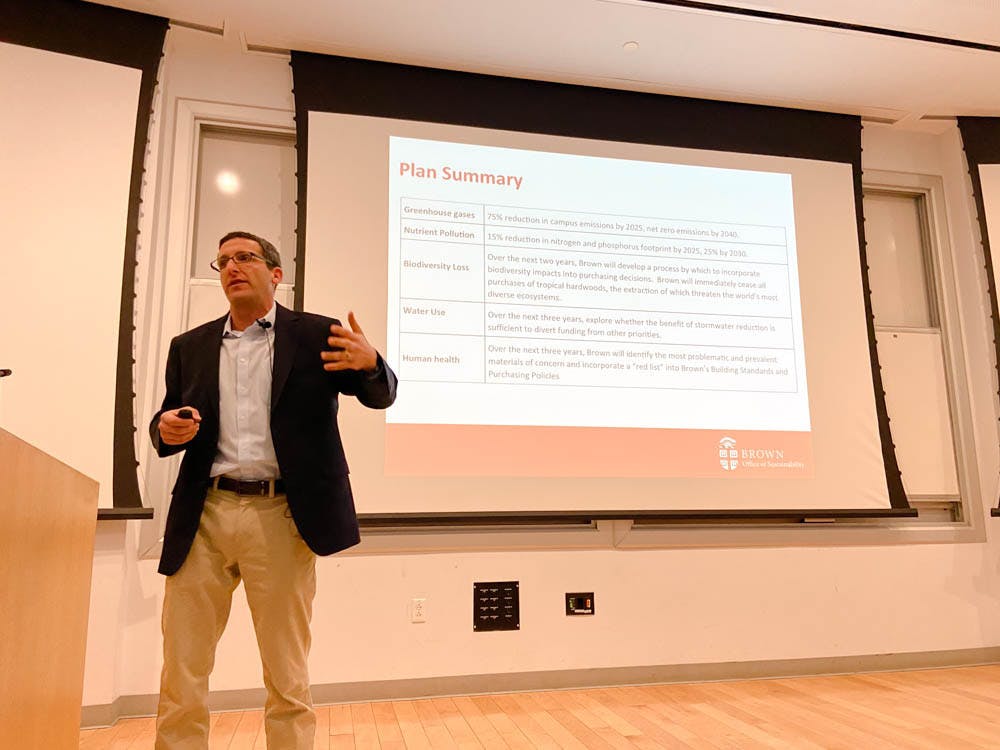The University’s draft Strategic Sustainability Plan Report received feedback from community members who urged a greater focus on equity and climate justice at an open forum Wednesday.
The forum, led by Stephen Porder, assistant provost for sustainability and professor of ecology, environment and society and evolutionary biology, aimed to incorporate community dialogue into the draft before implementation can be planned and executed within the University’s operations. Approximately 40 community members, including a mixture of faculty, staff and students were present at the forum.
The report outlines a vision for the University’s efforts to combat climate change by mitigating the environmental effects of University operations. The committee responsible for the draft plan is comprised of Brown faculty, two undergraduate students and one graduate student.
“The biggest one (takeaway) that came away from today’s meeting … was this discussion of equity and the social side,” said Jessica Berry, director of the Office of Sustainability. “And that is no surprise, but today’s forum really brought to light that that is something that needs to be addressed in some way.”
The report emphasizes five categories of environmental effects: greenhouse gases, nutrient pollution, biodiversity loss, water use and human health. Specific goals include net zero greenhouse gas emissions by 2040, a 25 percent reduction in the University’s nitrogen and phosphorous footprint by 2030 and ending the purchase of all tropical hardwoods.
While these focus areas are different from those of typical environmental action plans, such as energy, waste reduction or transportation, Berry believes that these traditional bucket categories naturally relate to those chosen for the sustainability report.
After outlining the plan, Porder opened the floor for community discussion. One community member called for a greater inclusion of equity and a focus on using the plan to directly assist marginalized communities disproportionately affected by climate change. Another attendee suggested greater crosstalk between the committee and the staff involved with the Academic Diversity & Inclusion Action Plans.
Forum members also suggested a greater focus on the larger Providence community.
Zanagee Artis ’22, leader of international climate justice organization Zero Hour, emphasized the need for the social aspect of climate change to be considered in the plan. “The sustainability plan, as it is now, is a lot of hard science. … We need to focus more on the human health side of the plan,” Artis said.
While Artis thought the forum was a great step towards involving student feedback, he saw a need for greater campus outreach.
“A lot of people who self-select to come to these things are already engaged in environmental work,” he said. “So to see students on campus who might be doing different work, whether it’s in ethnic studies or urban studies, … would be really great for the planning.”
An overarching goal for the plan that Porder articulated was to incorporate sustainability into the “daily fabric” of life at the University. He referenced carbon sensors installed in University buildings as an example of the paradigm shift he hopes the plan will invoke. “Before we started down the carbon reduction goal, the reason we were putting sensors in buildings was because that was a way to get rebates on electricity bills, so it sort of paid for itself,” Porder said. “Once you switch the vision to ‘No, the goal is carbon reduction, not just to get rebates,’ and we’re willing to pony up some money, then the conversation changes.”
A second meeting to discuss the plan will be held on March 2 by Brown Climate Action Now at 85 Waterman Street.





